
This modern Seattle home was built on a bluff overlooking Puget Sound in Zone 8b. When I first took on the project, the steel-and-glass house stood on a dirt-and-gravel work site. I was inspired by the contemporary lines of the home, the view of the city skyline, and the dynamic activity of the harbor below. The homeowners wanted a modern landscape design that would look good with their house, but it was also apparent that the strong lines and angles of this home needed some softening to balance out the look of the property. This site is also at the edge of a steep slope leading down to the water, which is one of Seattle’s environmentally critical areas (ECAs) and therefore had extra regulations involved in building around it. Designing a garden with these requirements was a challenge, but the combination of lush plantings and modern hardscape elements provide dynamic accents that work with and soften the sleek lines of the home, bolstering it and letting it shine.
See more of this garden
Planting Plan for a Stunning Modern Garden
Textured Plants that Steal the Show
Groupings of textured plants tone down sharp angles
The hardscaping elements selected for this space complement the modern, angular look of the house. Many of those angles are severe. They are highlighted by plants with standout forms, while fine-textured plants introduce contrast. Repetition of key plants throughout the garden, including ‘Sky Pencil’ Japanese holly (Ilex crenata ‘Sky Pencil’, Zones 5–9) and ‘Elijah Blue’ blue fescue (Festuca glauca ‘Elijah Blue’, Zones 4–8), adds structure to the beds and serves to guide the eye around the small space. All of the plants in this garden needed to be drought and wind tolerant. While there are a few flowering plants, they are not the focus of the design. Instead, colorful foliage steals the show.
Providing an accessible, private layout with restrictions in mind
This location proved to be a challenging one for building a garden, as it is located on a windy site next to Puget Sound and was subject to extra environmental regulations. Deep steel pilings reinforce the steep slope that leads down to the harbor. Retaining walls incorporating steel planters were installed above to provide privacy along the garden edge. Several paths made of precast pavers lead visitors through the garden and to a side courtyard and a backyard complete with a seating area and fireplace. The garden provides privacy but still feels like an open space.

A. Front gardens
B. Permeable driveway
C. Entryway
D. Courtyard
E. Bamboo planters
F. Side path
G. Seating area and firepit
H. Retaining wall and steel planters
Raised beds were added at the front of the house, and selected native plants such as Kelsey’s dwarf redtwig dogwood (Cornus sericea ‘Kelseyi’, Zones 2–8) and fine-textured soft rush (Juncus effusus, Zones 4–9) were incorporated into the concrete planters, along with a feathery ‘Firefly’ heather (Calluna vulgaris ‘Firefly’, Zones 4–8). These plants were included because of their tolerance of extreme conditions, their interesting textures, and their ability to provide efficient stormwater mitigation and infiltration.
The entryway combines more lush textures, including gray-green ‘Elijah Blue’ blue fescue and contrasting bronzy leatherleaf sedge (Carex buchananii, Zones 6–9) and orange New Zealand sedge. All of these plants have a grassy look. Their soft textures are offset by the bold forms and textures of shrubs such as privet honeysuckle (Lonicera pileata, Zones 6–8) and ‘Georgia Petite’ Indian hawthorn (Rhaphiolepis × delacourii ‘Georgia Petite’, Zones 8–10). The paver walkway leading to the house is lined with reddish ornamental grasses that repeat the warm tones found in the steel house siding and the bronzy sedges.
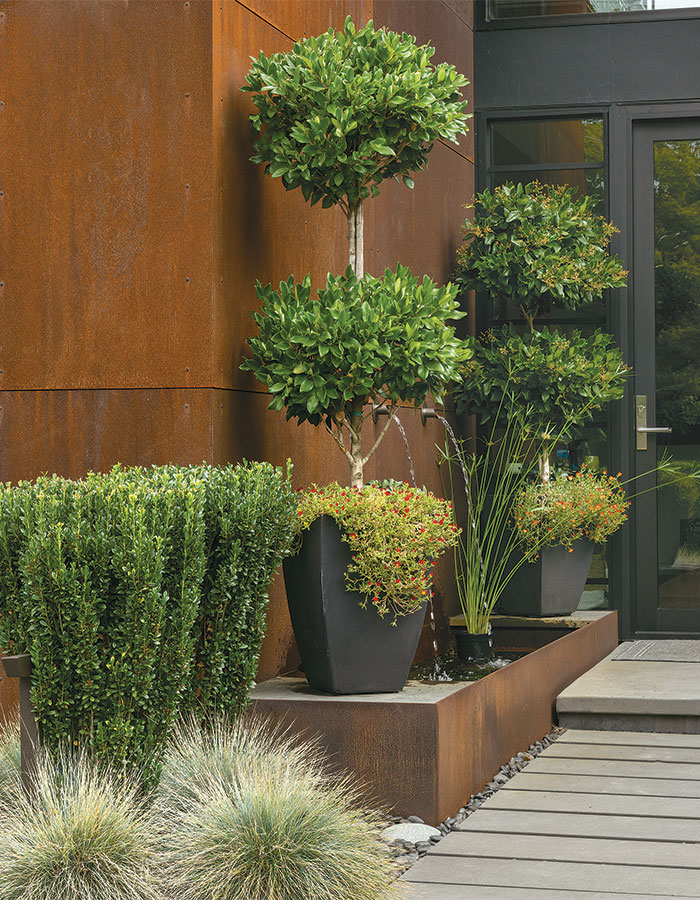
Beyond the entryway, a side path connects the front and back gardens. This path is sprinkled with layers of chartreuse variegated purple moor grass (Molinia caerulea subsp. caerulea ‘Variegata’, Zones 4–9) and ‘Lemon-Lime’ heavenly bamboo. The grassy foliage of these spilling plants adds a softening effect to the concrete pavers and Mexican pebbles that make up the side path. These layered plants are anchored by bolder ones with strong vertical forms such as ‘Sky Pencil’ Japanese holly, ‘Green Spire’ euonymus (Euonymus japonicus ‘Green Spire’), and ‘Midwinter Fire’ bloodtwig dogwood (Cornus sanguinea ‘Midwinter Fire’, Zones 5–8) that add height and dimension to the space.
Corten steel planters dominate the back border. They also contain an array of different textures, including the bold, broad leaves of ‘Rainbow Sunrise’ New Zealand flax and the finer foliage of Beyond Blue® blue fescue (Festuca glauca ‘Casca11’, Zones 4–9) and ‘Aureola’ Japanese forest grass (Hakonechloa macra ‘Aureola’, Zones 5–9). These plants provide a mellowing effect to the harsh lines of the steel planters.
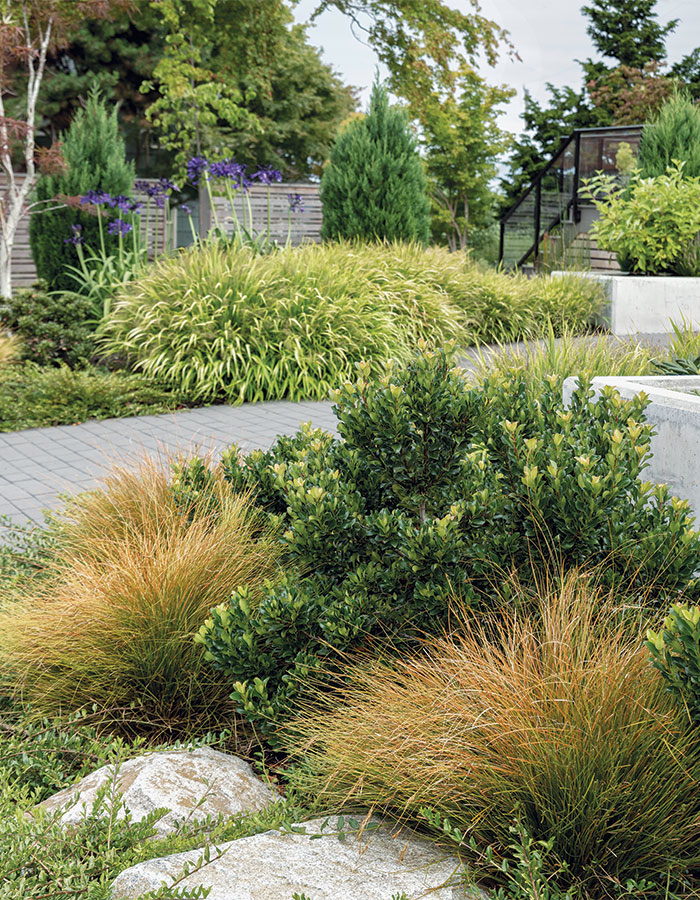
Mix hardscaping styles and materials to provide balance in modern landscape design
The primary goal of the homeowners was to create a welcoming entryway and a relaxed landscape to work with the home’s steel features. The front yard required the use of concrete bioretention planters and a pervious driveway to create proper drainage and reduce the stormwater impact for the entire site. The homeowners also wanted to screen the neighbors’ yard, add retaining walls to border the steep slope in the backyard, and incorporate an outdoor space for a firepit and chairs.
Much of the hardscaping complements the look of the house, which has bold, angular lines and a mix of contrasting colors, such as light gray, bronze, and brown. Precast light gray rectangular concrete pavers echo the sleek horizontal lines of the home and the bold concrete walls used in the front of the house. These pavers appear in the entryway and along the side path leading to the back garden. Black Mexican pebbles placed around and between the pavers provide contrast and echo the black trim of the house.

Square pavers are used in the rear of the house and can cast blue in the bright sunshine. To soften the harsh angles, whimsical spheres of Scotch moss (Sagina subulata ‘Aurea’, Zones 4–8) were planted between these pavers, which fill the path leading to the firepit. The path also heightens the impact of the firepit space, drawing attention to the foliage-filled planters and joining it with the view of downtown Seattle and the Cascade Mountains beyond. As a contrast to the bolder aspects of the hardscaping, loose gravel is used for a more informal, softer look in the courtyard and the backyard surrounding the firepit.

Keep the layout open and airy while still providing privacy
The house sits on a small city lot, but there is plenty of privacy provided through the garden. The courtyard is bordered with a steel planter filled with golden bamboo, which provides screening, texture, and a gentle sound as it moves in the breeze. This plant makes a perfect screen, while its fine texture makes the space seem more open rather than closed off. Several raised beds and retaining walls add structure to the property and provide further privacy.

In the backyard near the firepit, wooden walls along the side of the house and garden are bordered by large grasses and woodies such as sasanqua camellia (Camellia sasanqua, Zones 7–9) and dwarf eastern white pine (Pinus strobus ‘Nana’, Zones 3–9), which soften the harshness of the walls. The backyard steel planters create a rim around the back of the garden that punctuates the expansive view, allowing viewers to look over them into the harbor beyond. Visitors can enjoy being right on the water while still shielded from passers by. Vibrant plants such as ‘Grace Ward’ lithodora (Lithodora diffusa ‘Grace Ward’, Zones 6–9) spill over the edge of the planters to create an even more relaxed feel. Meanwhile, ‘Karl Foerster’ feather reed grass (Calamagrostis × acutiflora ‘Karl Foerster’, Zones 5–9) and textural evergreens frame the edges of the back garden. While they sway in the breeze, they compel visitors to stay a little bit longer.

This home and garden make a striking statement in the beachy microclimate of West Seattle. The structural hardscape complements the house while flowing textured plants move beautifully in the wind. Together they provide a sense of peace and calm on this hillside refuge across the harbor from the bustling city.
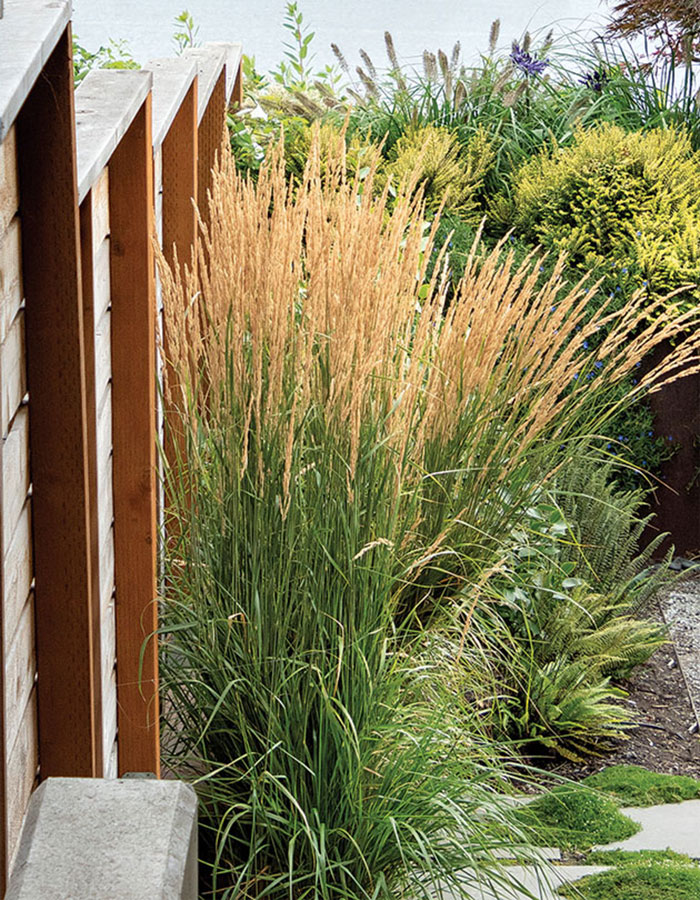
Basics
How to Contain Bamboo

Golden bamboo (Phyllostachys aurea, Zones 7–11) provides an attractive privacy screen in this garden. A rhizomatous plant, it is well suited for hedges or for use as a specimen plant because of its dense branches of evergreen foliage. Planting it in steel containers has a dual purpose: The contemporary style adds a bold accent, and it prevents the plant from spreading into unwanted places. Here are a few tips for growing and containing bamboo in an attractive way:
- Plant it in a steel planter with a polyethylene liner around the edge to create a barrier for keeping the roots contained. You can find these liners in hardware stores or online.
- Provide a depth of 2 feet of soil, as the roots typically travel in the first 14 inches. Grow it in well-drained, fertile soil that is neutral or slightly acidic.
- Install an efficient watering system, such as drip emitters.
- Monitor roots for pruning on a yearly basis. Simply snip off any errant roots near the surface or sides of the container.
Robin Parsons is a member of APLD and the owner and operator of Spring Greenworks, LLC, a landscape design company based in Seattle.
Photos, except where noted: doreenwynja.com


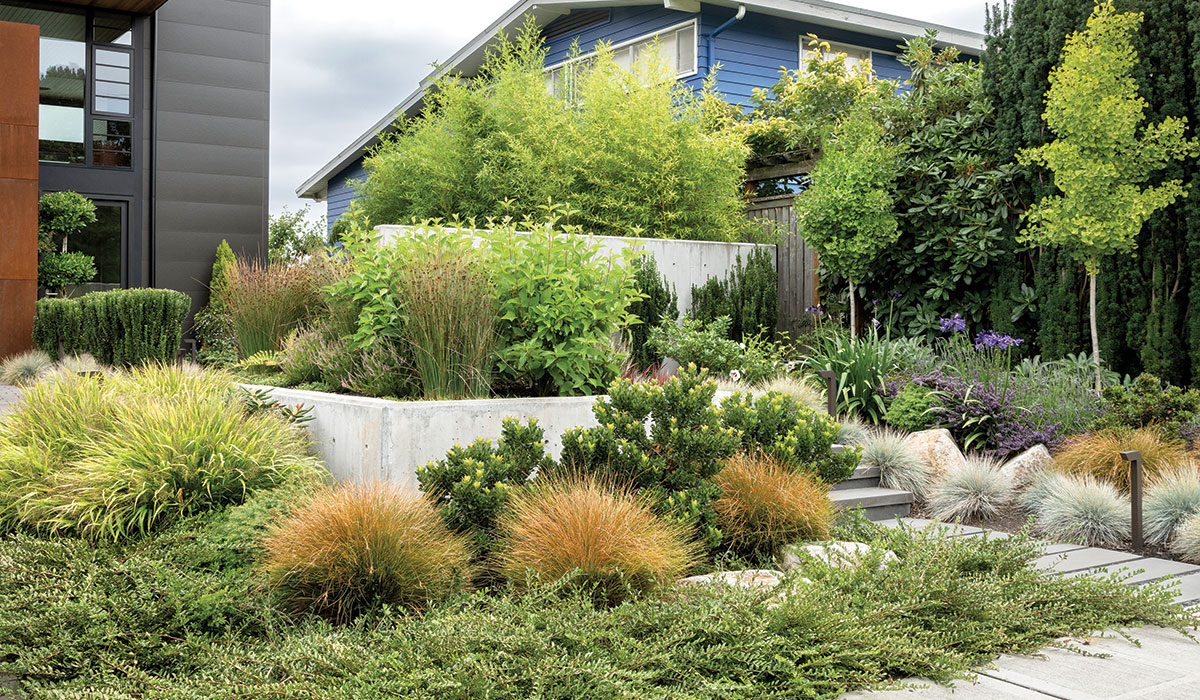
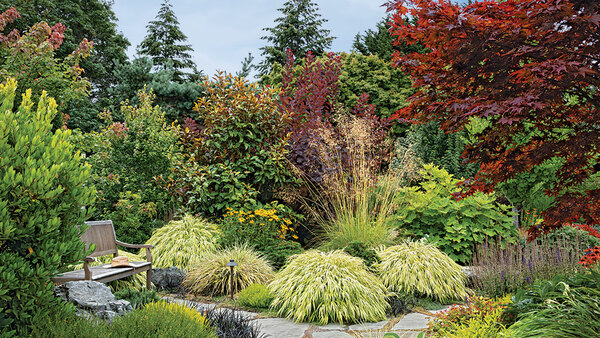
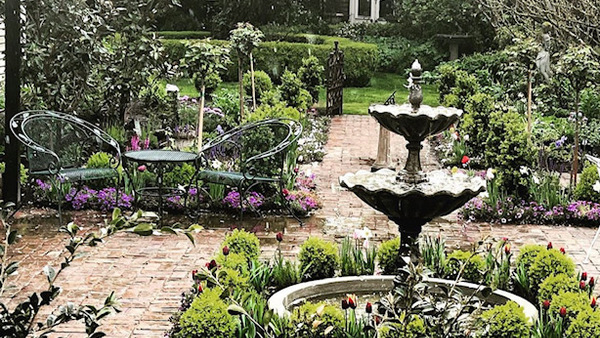
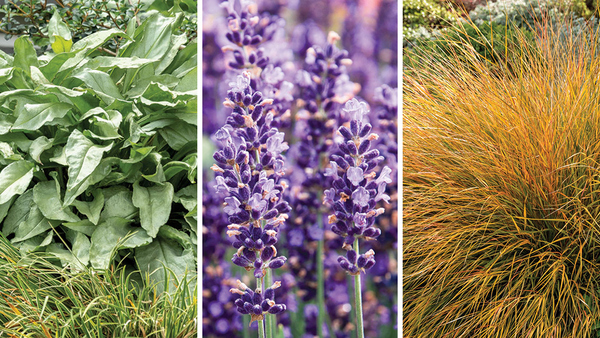
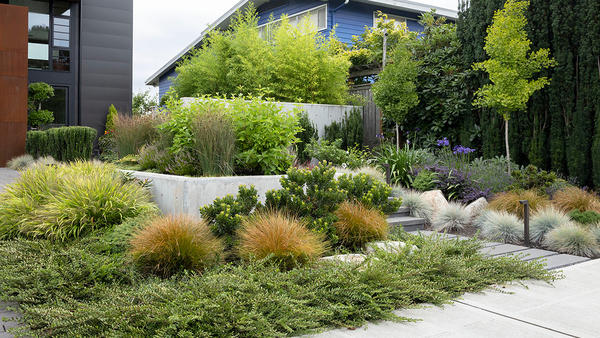
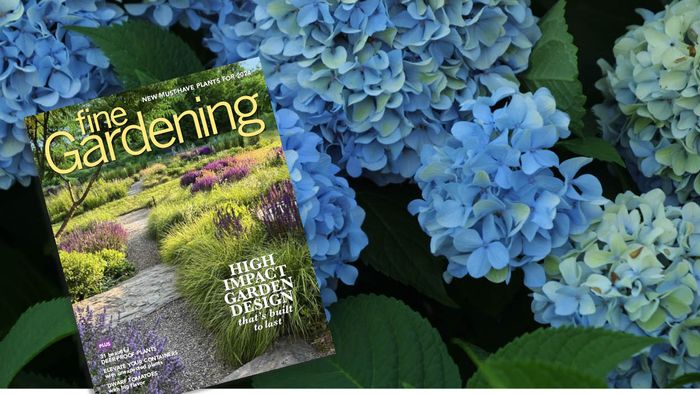
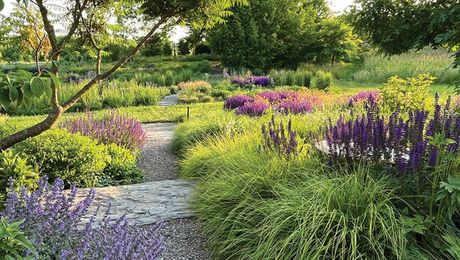
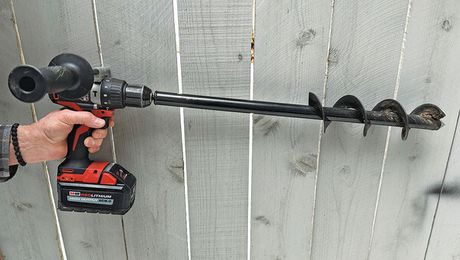

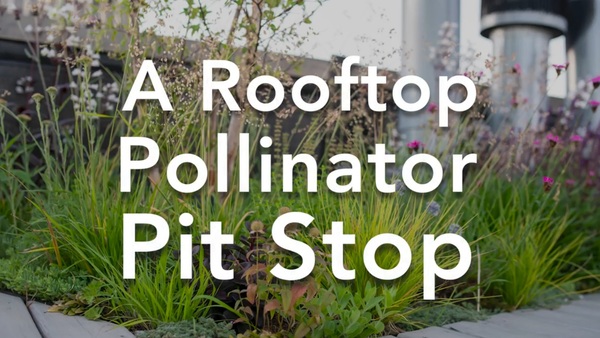
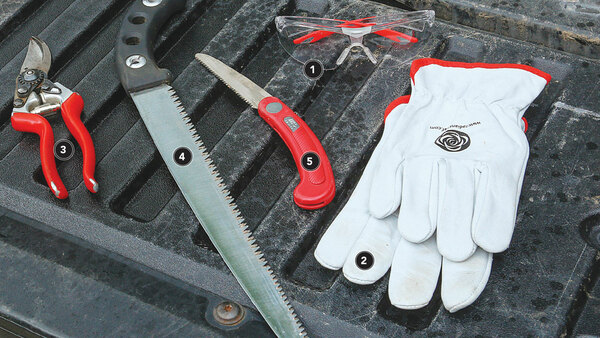
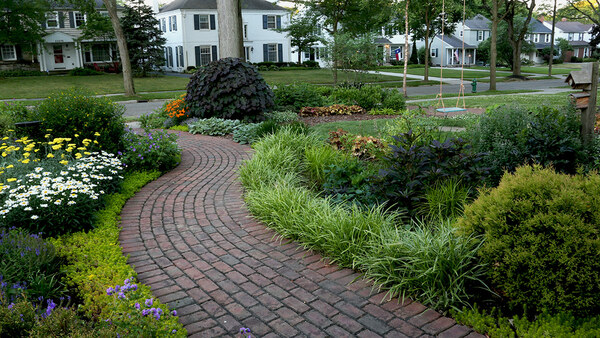
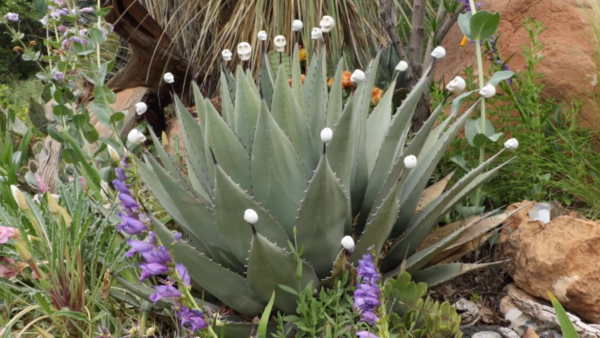


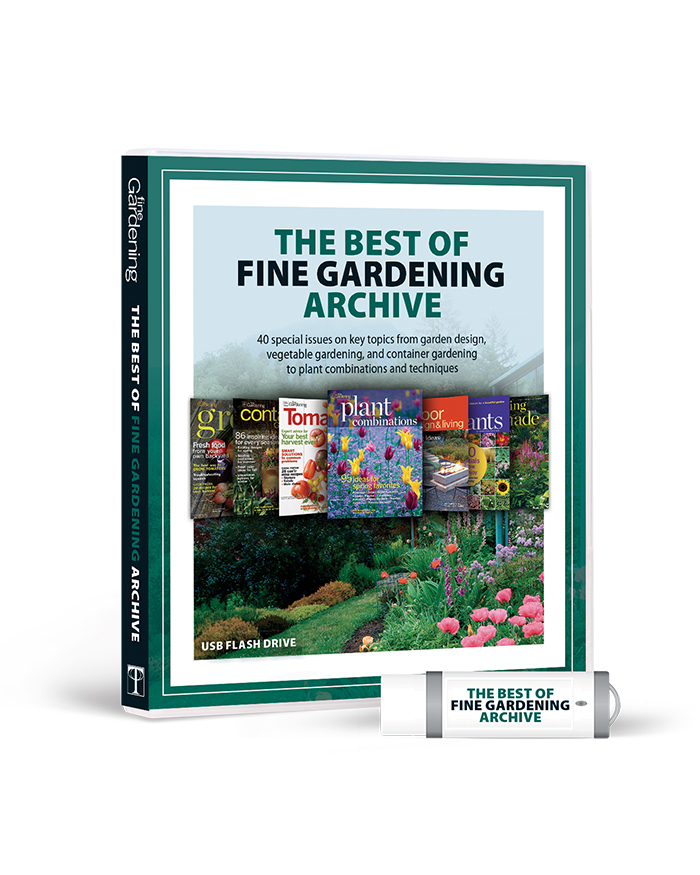
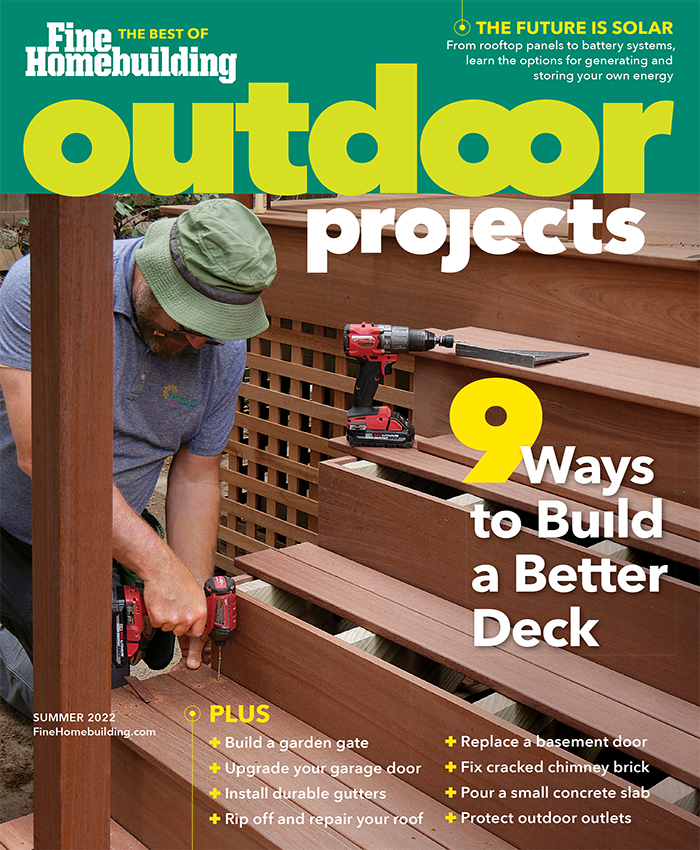
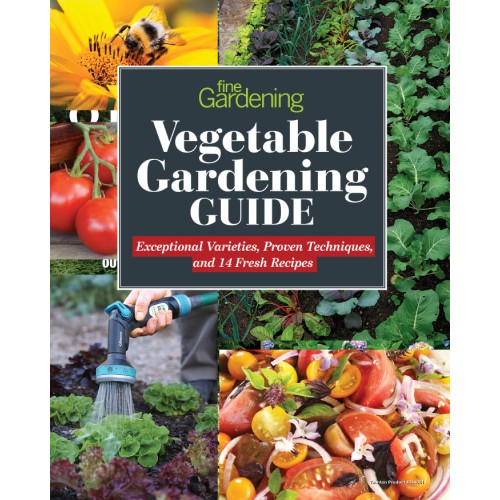


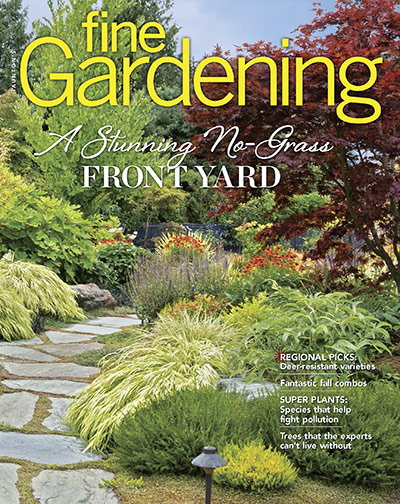
Comments
There are many popular Tower Defense games. Some of the best games include Bloons TD 6, Kingdom Rush Vengeance, Plants vs Zombies, and our web site has them all.
What a fantastic article on modern landscape design! I was particularly intrigued by the emphasis on using textured plants to soften the bold architectural lines of the contemporary home. One tip I'd like to add is considering the use of outdoor lighting to enhance the garden's aesthetics, especially during the evening. Well-placed lights can highlight the unique textures and colors of your plants and hardscape elements.
I will be sure to share this with our team over at https://www.landscapewellington.com/.
Thanks
Log in or create an account to post a comment.
Sign up Log in